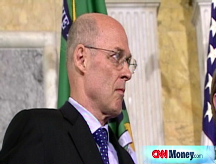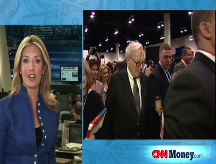Debate keeps Wall Street on edge
Stocks end a choppy session mixed on concerns about whether the bank bailout plan will pass and with what provisions.
NEW YORK (CNNMoney.com) -- Stocks ended a choppy session little changed Wednesday as the $700 billion bank bailout hearing raged on, with officials warning that delaying passage could be disastrous for the economy and lawmakers urging caution.
Warren Buffett's $5 billion investment in Goldman Sachs propelled Goldman stock, but failed to lift the broader financial services sector.
The Dow Jones industrial average (INDU) and the Standard & Poor's 500 (SPX) index both ended the session with small declines. The Nasdaq composite (COMP) ended the session higher.
Treasury prices rose, lowering the corresponding yields, as investors sought safety in government debt. The 3-month Treasury bill, seen as the safest place to park money in the short term, fell to 0.445% from 0.795% late Tuesday, suggesting investors' willingness to take risks was low.
"Investors are as rattled as I've ever seen them right now after the historic events of the last few weeks," said Kenny Landgraf, principal and founder at Kenjol Capital Management.
On Wednesday, Treasury Secretary Henry Paulson and Federal Reserve Chairman Ben Bernanke tried to reframe the debate on Capitol Hill in terms of why the $700 billion bailout will protect taxpayers, as well as Wall Street.
But lawmakers remain skeptical regarding the size and scope of the package, and whether it offers taxpayers enough protection. (Full story)
"I think the general consensus is that a [version of the] plan has to work and they will find a way to make it work, but there are still a lot of questions about how and when," said Russell Lundeberg Jr., CEO at Barrett Capital Management.
He said markets have also been volatile this week as the quarter nears an end. As a result, portfolio managers are rebalancing portfolios, both in response to changes in regulations - and to position themselves amid the latest leg of the downturn.
Bailout: Stocks struggled as the heated debate between economic officials and the Senate Banking Committee dampened hopes that a rescue plan will see quick passage.
Bernanke appeared before the Joint Economic Committee earlier in the day and the House Financial Services Committee in the afternoon, while Paulson also spoke to House lawmakers in the afternoon. At 9 p.m. ET, President Bush will address the nation on the situation. (Here's where things stand now.)
Bernanke told the joint panel that crisis could drag the U.S. economy into a deeper downturn and that swift action is needed on a bailout, essentially reiterating what he told the Senate at Tuesday's hearing.
In the afternoon, both Bernanke and Paulson talked more directly about why they think failure to act swiftly will be as detrimental to consumers as to Wall Street.
Paulson said the plan was necessary "in order to avoid a continuing series of financial institution failures and frozen credit markets that threaten American families' financial well-being, the viability of businesses both small and large, and the very health of our economy."
However, lawmakers are concerned about whether provisions are needed to protect taxpayers, such as letting the government get stock in the companies it's absorbing bad debt from.
"It's valid to ask the kinds of questions that are being asked with the sheer magnitude of the sum," Landgraf said. "But on the other side of it, you have Paulson and Bernanke warning that if something doesn't happen very soon, the consequences are going to be a lot worse than $700 billion."
The current proposal lets the Treasury buy up bruised assets from troubled financial firms, hold them, and sell them later for profit. The idea is that with the bad assets off their balance sheets, companies will be willing to lend to each other again, loosening up the jammed credit markets.
Businesses depend on the credit markets to function on a daily basis, and the absence of ready capital has threatened to stall the broader financial system.
Financial crisis: The proposal followed an extraordinary week on Wall Street that began with Lehman Brothers (LEH, Fortune 500) filing the biggest bankruptcy in history, continued with Bank of America (BAC, Fortune 500) buying Merrill Lynch (MER, Fortune 500) in a $50 billion stock deal and ended with AIG (AIG, Fortune 500) narrowly avoiding bankruptcy thanks to a Fed bailed in the form of an $85 billion bridge loan.
The government stepped in to aid Fannie Mae and Freddie Mac earlier this month and Bear Stearns last March.
In a continued bid to boost liquidity, the central bank said Wednesday that it had struck a deal with four nations to make up to $30 billion for loans to U.S. banks.
On a separate note, the FBI is reportedly investigating Fannie Mae, Freddie Mac, Lehman Brothers and AIG and their executives as part of a broader look into possible mortgage fraud, amid the credit market collapse.
Buffett invests in Goldman: Goldman Sachs (GS, Fortune 500) said late Tuesday that Warren Buffett's Berkshire Hathaway is investing at least $5 billion in the bank through a preferred stock purchase and could buy up to $5 billion in common stock over the next five years. Separately, Goldman said it is raising $5 billion in common stock.
Buffett's investment could be seen as restoring confidence in the storied Wall Street firm, amid the ongoing credit market fallout. However, some analysts say its very expensive for Goldman. (Full story)
Goldman shares gained 6.3% Wednesday.
Over the weekend, federal regulators said they were converting Goldman and Morgan Stanley (MS, Fortune 500) into bank holding companies, allowing them to buy smaller regional banks and have more direct access to Federal Reserve funding. The move also puts the banks under the Fed's supervision.
Financial stocks tumbled Wednesday, including Morgan Stanley, Wachovia (WB, Fortune 500), Citigroup (C, Fortune 500) and Washington Mutual (WM, Fortune 500).
Market breadth was negative. On the New York Stock Exchange, losers beat winners by three to two on volume of 1.08 billion shares. On the Nasdaq, decliners topped advancers two to one on volume of 1.83 billion shares.
Economic news: Existing home sales fell more than expected in August, according to an industry trade group report released Wednesday morning. (Full story)
Oil and gold: Oil prices climbed Wednesday as investors put money in safe-haven assets and reacted to the government's weekly oil inventory report. Released in mid-morning, the report showed lower-than-expected crude and gasoline supplies.
U.S. light crude oil for November delivery fell 88 cents to settle at $105.73 a barrel on the New York Mercantile Exchange. Prices spiked $16.37 a barrel Monday as the October contract expired, making it the biggest one-day dollar gain for oil ever.
Oil prices had been plummeting since peaking at $147.27 a barrel on July 11, as investors bet that sluggish global growth will diminish oil demand. But prices have soared as the financial crisis has intensified and investors sought hard assets to put their money into.
COMEX gold for December delivery rose $3.80 to $895 an ounce. Like oil, gold prices had also rallied during the biggest periods of unrest over the last few weeks.
Bonds: Treasury prices were mixed, with the yield on the benchmark 10-year note ending at 3.75%, little changed from late Tuesday. Treasury prices and yields move in opposite directions.
Treasury prices have been rallying recently and yields tumbling as nervous stock market investors have looked for safer areas to park their cash. The three-month Treasury bill fell to a 68-year low around 0% last week, demonstrating the utter lack of interest in risk-taking amid the financial market crisis.
Other markets: In currency trading, the dollar rose against the euro and the yen.
Gas prices fell for the seventh day in a row, according to a survey of credit card activity. (Full story).
In global trade, European and Asian markets both ended lower. ![]()






